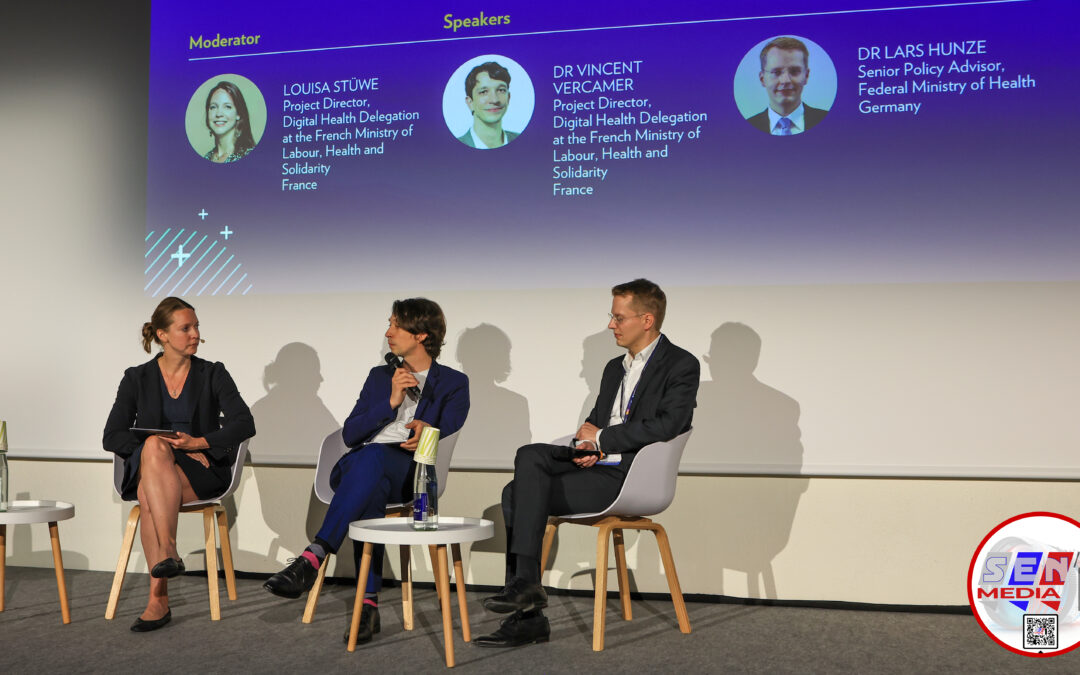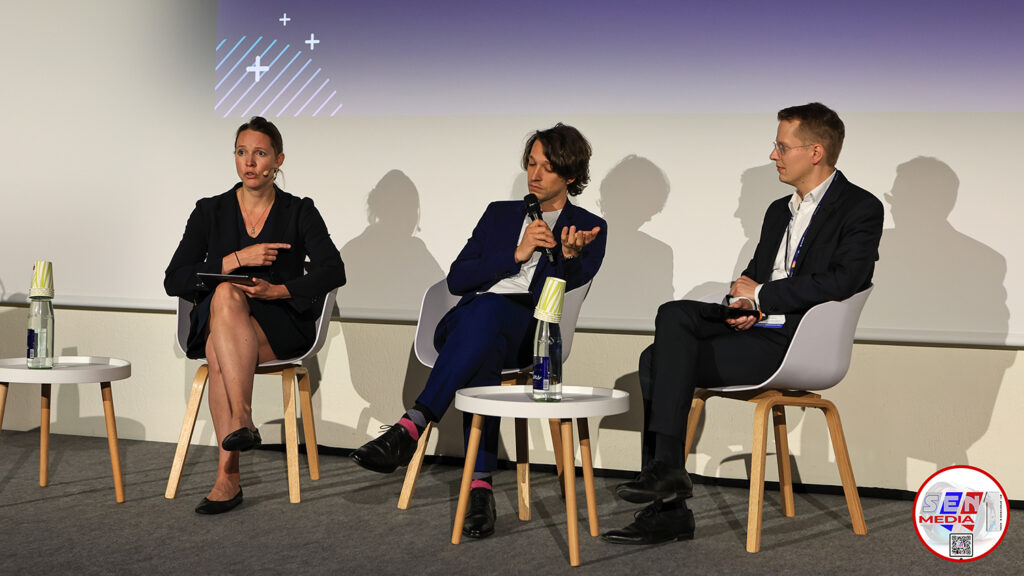At the HIMSS25 Europe conference held at the iconic Palais des Congrès in Paris, a high-level panel featuring French and German health officials marked a defining moment for digital health collaboration in Europe. In a discussion filled with optimism, realism, and shared ambition, France and Germany laid out a roadmap for cross-border digital therapeutics (DTx) integration and innovation—with the promise of a formal partnership on the horizon.
The session, moderated by Louisa Stüwe, Project Director of the Digital Health Delegation at France’s Ministry of Labour, Health and Solidarity, brought together Dr. Lars Hunze, Senior Policy Advisor at Germany’s Federal Ministry of Health, and Dr. Vincent Vercamer, Project Director within the same French ministry. Together, they explored progress, challenges, and the promise of harmonizing digital health efforts across the European Union.
Germany’s Digital Health is Gaining Momentum
LOUISA STÜWE – Project Director Digital Health France, DR VINCENT VERCAMER Project Director Digital Health France,
DR LARS HUNZE Senior Policy Advisor, Federal Ministry of Health Germany. Photo by: Steevens E. Noel
Kicking off the session, Dr. Hunze offered a confident assessment of Germany’s digital health strategy. “The patient is alive and well,” he said, referring to the success of DiGA, Germany’s framework for fast-tracking and reimbursing digital health applications.
Five years into the initiative, the data speaks volumes: over 60 DiGA-approved apps are reimbursed through public insurance, with prescription numbers surging by 67% year-over-year, reaching approximately 200,000 between 2023 and 2024. “We’ve seen particularly strong traction in mental health, where digital tools are helping close gaps in access to care,” he noted.
France’s PCAN Pilot Shows Steady Growth
France, too, is forging its own path through PCAN (Pilot for Cancer Digital Applications and Nutrition), a focused initiative supporting digital tools for cancer patients. Dr. Vercamer shared that 11 applications have been submitted so far, with three approved, and prescription activity doubling from 80 to 200 per month.
DR LARS HUNZE Senior Policy Advisor, Federal Ministry of Health Germany. Photo by: Steevens E. Noel
“These are encouraging signs,” he said. “While we’re still below our target of 50 applications by 2026, this is expected at the early stage of a new regulatory ecosystem. What matters is that patients are beginning to benefit.”
Bridging Challenges with Shared Solutions
As the conversation turned toward challenges, both speakers emphasized the need for integration and clarity—not only for healthcare systems, but for the innovators behind the technologies.
Dr. Hunze highlighted the importance of embedding digital health tools into clinical routines, ensuring they support—not complicate—the work of doctors and nurses. “We have to move from a tech-first mindset to a patient-first strategy,” he said. “Digital tools must be evaluated on how they fit into the healthcare journey, not just on their novelty.”
Dr. Vercamer echoed the sentiment, noting that many startups struggle to navigate the evaluation process. “Today, innovators submit their applications without the chance to explain their solution’s value in context. That’s a missed opportunity, especially for small companies,” he said. Plans are underway in France to extend PCAN’s evaluation timeline and allow for more interactive review mechanisms.
A Formal Agreement to Lead Europe Forward
DR LARS HUNZE Senior Policy Advisor, Federal Ministry of Health Germany. Photo by: Steevens E. Noel
In a powerful moment, Ms. Stüwe announced that later that day, France and Germany would formalize a bilateral cooperation agreement between their respective health ministries and HTA (Health Technology Assessment) agencies. This joint initiative will streamline evaluations, foster transparency, and prepare both countries for the broader EU Health Technology Assessment Regulation due in 2030.
“France and Germany are the EU’s two largest health markets,” she said. “When we move in sync, we send a strong signal to our neighbors—and we help set the standard for the rest of Europe.”
Both experts welcomed the agreement and pointed to future goals. Dr. Vercamer called for retrospective analysis of DTx decisions in each country to understand divergences and strengthen evaluation consistency. “We can’t afford to wait until 2030,” he said. “Voluntary cooperation starts now.”
Dr. Hunze added, “This is not about one big leap—it’s a gradual process. But if a therapy works in France, it should work in Germany, and eventually beyond.”
Empowering the Patient Voice
The discussion also underscored the importance of patient empowerment. Dr. Vercamer praised Germany’s approach, where patients can request specific digital therapies for chronic conditions and get reimbursed. “That’s the kind of access we should be working toward everywhere. It’s about putting real choice in patients’ hands.”
As the session closed, both speakers reaffirmed their shared mission: not just to digitize healthcare, but to humanize it through thoughtful, cooperative innovation. The formal agreement signed at HIMSS25 Europe is just the beginning.
Looking Ahead
HIMSS25 Europe may be remembered as the moment France and Germany truly aligned their digital health strategies—not only to serve their own citizens, but to inspire a broader European model of progress. With real-world data, honest dialogue, and a clear path forward, the message from Paris is hopeful and resolute: the future of health is digital, and it’s already underway.









